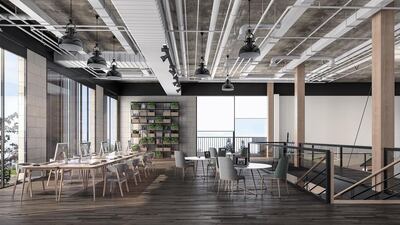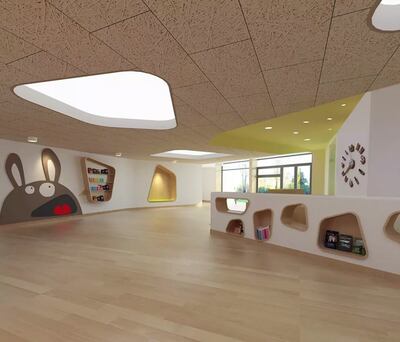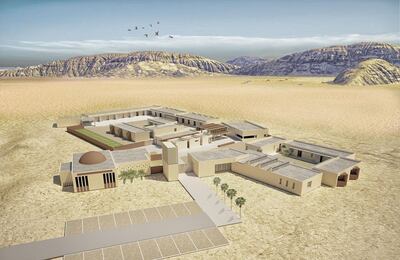Hailing from an Egyptian family with four generations of architects, Sarah El Battouty has earned a place among the Arab world’s most populous nation’s climate change pioneers.
Ms El Battouty made her foray into the world of green architecture back in 2001 after earning a bachelor’s degree in architecture from the University of Cambridge. Along with her flagship enterprise, ECOnsult, they made their way to the top of Egypt’s sustainability sector, competing with some of Mena’s biggest multinational real estate players.
Following a long list of meteoric successes, including being the first Middle Eastern company to be nominated for the esteemed Earth Shot Award, Ms El Battouty was last year appointed a global ambassador with the UNFCCC, the UN arm that manages climate change and administers the annual Conference of Parties. The 27th Cop is taking place in Sharm El Sheikh in November.
She was also commissioned by the Egyptian government to design the country's pavilion at Cop27.
Though the logical step after earning her degree was to join her family’s established architecture firm, Ms El Battouty decided to make a risky venture into green architecture and strike out on her own.

She went on to earn degrees in sustainable development and project management from London’s renowned School of African and Oriental Studies, and rural project management from the Centre of Environment Development and Economic Policy.
Ms El Battouty told The National that Egypt’s business world when she established ECOnsult in 2013 was significantly different from today. She said older prejudices, particularly against women, were against her from the start.
However, this changed after her company proved itself as a serious contender despite its relatively small operation.

“When we started, no bank, institution, university, lender or venture capitalist would even consider supporting a green building company like ours. Let alone one owned by a woman, with over half of its staff being women who are receiving equal pay to their male counterparts,” Ms El Battouty said.
Amid a business climate with no access to seed funds or the other support mechanisms present in today’s start-up-dominated sector, Ms El Battouty sold her own car to start ECOnsult.
“With the money I registered the company’s name, designed the logo, bought two laptops and hired three architects. That was ECOnsult,” she said.
Despite remaining a small company because of an admitted neglect of branding and PR, ECOnsult’s track record comprises a long list of small, medium and large scale projects carried out both in Egypt and abroad.

“We don’t come from a business culture with seed start-up funds and seed rounds," Ms El Battouty said. "We didn’t bother with trying to enter the right scene or making our company cool or trendy. We also didn’t really know the value of branding and speaking events and all that.
"We really were singularly focused on our mission, which has always been to deliver affordable green solutions on buildings."
Some of the company’s most renowned design projects abroad include a cafe in Palma, Italy, made entirely out of refrigerator casings to service a nearby church, and a massive complex of vertical gardens in Singapore. This was commissioned by a local developer to tackle the country’s worsening pollution problem. The company was also commissioned to make a climate-controlled nursery in China.
In Egypt, ECOnsult’s roster includes the country’s first globally certified bank branch, one belonging to Banque Misr, which opened last year. More recently, the company designed a branch in the Egyptian city of Aswan for the country's national postal service.
However, the company’s magnum opus, for which it was named a finalist at the 2020 Ashden Awards, is a residential village. This was made to house workers of a nearby farm owned by Royal Herbs, an Egyptian company that produces various kinds of herbal teas.
The 4,200-square-metre village, the first carbon-neutral project in Mena, was built for heat resilience because of its location in Egypt’s western oases. Here, temperatures can reach 50°C in the summer months.
The design reduced the temperature inside the residences by 10°C compared with the outside. This was achieved mainly through manipulating air-flow inside the structures and installing solar panels on the roof.
The model removed the need for energy-intensive air conditioning units, which in turn cut costs for the company significantly
Ms El Battouty said reducing costs for businesses was how ECOnsult rose to the top of the green design scene in Egypt. At a time when few businesses took green projects seriously, ECOnsult knew that it had to prioritise its clients profit interests while achieving its own goals.
“Early on, we’d approach a business or government entity with an offer to reduce their energy costs by 20 per cent, and we’d get that done,” Ms El Battouty said. “After being hesitant to work with us, they began to trust us more. So it got to the point where clients were approaching us and asking us to build larger and larger projects.”

She recalled more pushback from companies to introduce energy-saving mechanisms earlier in the 2010s. But, as the decade progressed and Egypt’s government began to slowly reduce subsidies on energy, they began to see the merit in transitioning to green energy.
Ms El Battouly is excited that Cop27 is this year being held in the global south, where some of the countries most affected by climate change are. She hopes to encourage more women to venture into green enterprises at the conference.
She will attend it in a number of capacities: as the chief executive of ECOnsult, as a policy advisor for the Egyptian ministries of planning and environment and as a UNFCCC global ambassador.
The next step for ECOnsult with Ms El Battouty at the helm is a coming collaboration with the government on one of its largest social welfare programmes. This aims to update lower-income housing, particularly in rural areas, to make it more environmentally friendly.







